- Home
- Martin Cruz Smith
Gorky Park Page 3
Gorky Park Read online
Page 3
‘Yes?’ Iamskoy turned the paper over and looked up. His eyes were pale, like watery diamonds. As always, his voice was so soft that a listener had to concentrate. Concentration, Arkady had decided long ago, was the key to Iamskoy.
Arkady took one long step forward to deposit his report on the desk and retreated. Concentrate: exactly who are you and what do you have to say? Define precisely what benefit you perform for society.
‘Major Pribluda was there. You don’t mention his name.’
‘He did everything but piss on the bodies and then took off. Did he call to have me dismissed from the case?’
Iamskoy rested his eyes on Arkady. ‘You are chief homicide investigator, Arkady Vasilevich. Why would he want you dismissed?’
‘We had a problem with the major a short time ago.’
‘What problem? The KGB stated their jurisdiction, so the matter was successfully concluded.’
‘Excuse me, but today we found three young people who were executed in a public park by a skilled gunman using a 7.65-mm. pistol. The only guns Muscovites can get are Army issue, 7.62-mm. or 9-mm., nothing like the murder weapon. Also, the victims suffered mutilation. So far, my report draws no inferences.’
‘Inferences of what?’ Iamskoy raised his eyebrows.
‘Of anything,’ Arkady answered after a pause.
‘Thank you,’ Iamskoy said. It was his form of dismissal.
Arkady was at the door when the prosecutor spoke again as an afterthought. ‘All legalities will be observed. You must overlook the exceptions, which really only prove the rule.’
Arkady bowed his head and left.
Fet and Pasha had taped up a map of Gorky Park, Levin’s sketch of the death site, death photos and autopsy reports. Arkady slumped into his chair and opened a fresh pack of cigarettes. Three matches snapped before he got one to light. He put the three broken matches and the burnt one in the middle of his desk. Fet watched, frowning. Arkady got up to pull down the death photos and place them in a drawer. He didn’t need to look at those faces. He returned to his chair and played with the matches.
‘Do any interviews yet?’
Pasha opened a notebook. ‘Ten militia officers who don’t know anything. If it comes to that, I probably skated by that clearing fifty times this winter.’
‘Well, try the food vendors. Those old women notice a lot of things the militia don’t.’
Fet plainly didn’t agree. Arkady looked at him. With his hat off, Fet’s ears stuck out at what Arkady guessed was just the right architectural angle to support the steel-rimmed glasses.
‘You were there when the last bullet was found?’ Arkady asked him.
‘Yes, sir. GP1–A was recovered from the ground directly below where the skull of GP1, the first male, had been.’
‘Fuck your mother, I’ll be happy when we have some names for these corpses instead of One, Two and Three.’
Pasha bummed a cigarette from Arkady. ‘Like what?’ Arkady asked.
‘Match?’ Pasha asked.
‘Gorky Park One, Gorky Park Two—’ Fet began.
‘Ah, come on.’ Pasha shook his head. ‘Thanks,’ he told Arkady and exhaled. ‘Gorky Park One? He’s the big guy? Call him “Muscles”.’
‘Not literary enough,’ Arkady said. ‘ “Beast”. “Beauty” for the woman, “Beast” for the big guy, “Skinny” for the little one.’
‘He really had red hair,’ Pasha said. ‘Red.’
‘ “Beauty”, “Beast” and “Red”. Our first major decision, Detective Fet,’ Arkady said. ‘Has anyone heard how Forensics is doing on those ice skates?’
‘The skates could be a ruse,’ Fet suggested. ‘It seems very hard to believe that three people could be shot in Gorky Park without other people hearing. The victims could have been shot elsewhere, then skates could have been put on them and they could have been carried to the park at night.’
‘It is very hard to believe three people could be shot in Gorky Park without other people hearing, I agree,’ Arkady said. ‘But it’s impossible to get ice skates on dead feet. Try it sometime. Also, the one place you wouldn’t want to try to sneak three dead bodies into at any time is Gorky Park.’
‘I only wanted to have your thoughts on that possibility,’ Fet said.
‘Excellent work,’ Arkady assured him. ‘Now let’s find out what Lyudin’s come up with.’
He dialed the Kiselny Street lab. On the twentieth ring, the switchboard answered and put him through to Lyudin.
‘Colonel, I—’ he got to say before he was disconnected. He dialed again. There was no answer at Kiselny Street. He looked at his watch. Four-twenty: time for the operators to shut down the board in preparation for leaving work at five. The detectives would want to go soon, too. Pasha to lift weights. Fet? Home to mother, or Pribluda first?
‘Maybe they were shot elsewhere and carried to the park at night.’ The investigator swept the matches aside.
Fet sat up. ‘You just said they weren’t. Also, I remember, we found the last bullet in the ground, proving they were shot there.’
‘Proving the victim, dead or alive, was shot through the head there.’ Arkady put one match back in the center of the desk. ‘No cartridges were found. If an automatic pistol were used, the shells would have been ejected onto the ground.’
‘He could have picked them up,’ Fet protested.
‘Why? Bullets identify a firearm as well as shells.’
‘He could have fired from a distance.’
‘He didn’t,’ Arkady said.
‘Maybe he thought to pick them up because if anyone found them they’d look for a body.’
‘He’s carrying the gun in his coat, not waving it around.’ Arkady looked aside. ‘The gun and the shells in its clip are warm to begin with. The ejected shells, heated more by the ejecting gases, would melt into the snow long before the bodies were covered by snow. I’m curious, though.’ He looked at Fet. ‘Why do you think it was a single gunman?’
‘There was a single gun.’
‘There was only one gun fired so far as we know. Can you imagine how difficult it would be for a single killer to make three victims stand still at close range while he fired – unless there were other gunmen with him? Why did the victims feel their situation was so hopeless they didn’t even run for help? Well, we’ll catch this murderer. We’ve only begun, and so many things always turn up. We’ll catch the fat son of a bitch.’
Fet didn’t ask, Why fat?
‘Anyway,’ Arkady concluded, ‘it’s been a long day. Your shifts are up.’
Fet was first out.
‘There goes our little birdie,’ Pasha said as he followed.
‘I hope he’s a parrot.’
Alone, Arkady called headquarters on Petrovka to send a republic-wide west-of-the-Urals bulletin for information on crimes by firearm, just to keep the militia commissioner content. Then he tried calling the school again. Comrade Teacher Renko, he was told, was leading a criticism session for parents and couldn’t come to the phone.
The other investigators were leaving, putting on their home-bound expressions and pulling on their coats. Their earnest coats, Arkady thought as he watched from the top of the stairs. Their better-than-a-worker’s Soviet cloth. He wasn’t hungry, but the activity of eating appealed to him. He felt like a walk. He got his coat and went out.
He walked south all the way to the Paveletsky train station before his legs took him into a cafeteria where there was a buffet of whitefish and potatoes awash in vinegar. Arkady moved on to the bar and ordered a beer. The other stools were occupied by railroad workers and young soldiers quietly drunk on champagne: sullen faces between malachite bottles.
A slice of bread with butter and sticky gray caviar came with Arkady’s beer. ‘What’s this?’
‘From heaven,’ the manager said.
‘There is no heaven.’
‘But we’re there now.’ The manager smiled with a full set of steel teeth. His hand darted out to push
the caviar closer to Arkady.
‘Well, I haven’t read today’s paper,’ Arkady conceded.
The manager’s wife, a gnome in a white uniform, came out of the kitchen. When she saw Arkady, she broke into a smile so powerful – it filled out her cheeks and drew attention to her lively eyes – that she seemed almost beautiful. Her husband stood proudly by her.
They were Viskov, F. N., and Viskova, I. L. In 1946 they constituted a ‘center of anti-Soviet activity’ by operating a rare-book store that harbored the scribblers Montaigne, Apollinaire and Hemingway. ‘Interrogation with prejudice’ left Viskov crippled and his wife mute (a suicide attempt with lye), and they were given what was jokingly called at the time 25-ruble notes: twenty-five years’ hard labor in the camps (a humor of the time when Security and the Militia were one and the same institution). In 1956 the Viskovs were released and even offered the chance to operate another bookstore, though they declined.
‘You were in charge of a cafeteria by the circus, I thought,’ Arkady said.
‘They found out my wife and I were both working there against regulations. She only comes in here to help on her own time.’ Viskov winked. ‘Sometimes the boy comes in to help as well.’
‘Thanks to you,’ Comrade Viskova mouthed.
God, Arkady thought, an apparatus accuses two innocent people, abducts them to slave camps, tortures them, rips out the heart of their adult lives, and then when one man from the apparatus treats them with the rudiments of decency, they are fountains of joy. What right did he have to a kind word from them? He ate his caviar, drank his beer and got out of the cafeteria as quickly as politeness allowed.
Gratitude was a dog at his heel. After a few blocks he slowed because the hour was one of his favorites, the evening a maternal black, windows small and bright, the faces on the street bright as windows. At this time of day he felt he could have been in any Moscow of the past five centuries, and he wouldn’t have been surprised by the sound of hooves in mud. In a store window shabby dolls were small, perfect Pioneers; a battery-driven Sputnik circled a moon-shaped lamp that urged ‘Look to the Future!’
Back at his office, Arkady sat in front of his cabinet and went through his files. He began with crimes by firearm.
Murder. A lathe operator returns home to find his wife screwing a naval officer, and in the ensuing struggle the worker uses the officer’s gun on its owner. The court took into consideration that the officer should not have been carrying a gun, that the defendant was attested by his union to be a diligent laborer, and that he repented his act. Sentence: ten years’ deprivation of freedom.
Aggravated murder. Two black marketeers fall out over a division of profits and both are amazed, one fatally, when a rusty Nagurin pistol works. Profit is the aggravating circumstance. Sentence: death.
Armed assault. (Some assault.) A boy with a wooden replica of a gun removes two rubles from a drunk. Sentence: five years.
Arkady went through his straight homicide files searching for crimes he might have forgotten, murders that displayed careful planning and cool boldness. In knives, hatchets, bludgeons and manual strangulation, however, there was little care or coolness. In three years as a deputy investigator and two as chief investigator, he’d encountered fewer than five homicides that rose above childlike stupidity, or following which the murderer hadn’t presented himself or herself to the militia drunkenly boastful or rueful. The Russian murderer had great faith in the inevitability of his capture, all he wanted was his moment onstage. Russians won wars because they threw themselves before tanks, which was not the right mentality for a master criminal.
Arkady gave up and shut the file.
‘Boychik.’ Nikitin opened the door without knocking and inserted his head, followed with his body, and sat on Arkady’s desk. The chief investigator for government liaison had a round face and thinning hair, and when he was drunk his smile screwed his eyes into Oriental slits. ‘Working late?’
Did Nikitin mean Arkady was working hard, too hard, futilely, successfully, that Arkady was smart, a fool? Nikitin conveyed it all.
‘Like you,’ Arkady said.
‘I’m not working – I’m checking on you. Sometimes I think you never learned anything from me.’
Ilya Nikitin was chief homicide investigator before Arkady and, when sober, the best investigator Arkady had ever known. Except for the vodka, he would have been a prosecutor long ago, but saying ‘except for the vodka’ in Nikitin’s case was like saying ‘except for food and water’. Once a year, yellow with jaundice, he was sent to a spa in Sochi.
‘You know, I always know what you’re up to, Vasilevich. I’m always looking out for you and Zoya.’
One weekend when Arkady was away, Nikitin had tried to get Zoya into bed. On Arkady’s return, Nikitin immediately got himself shipped to Sochi, from which he had daily sent long penitent letters.
‘Want some coffee, Ilya?’
‘Someone has to protect you from yourself. Excuse me, Vasilevich’ – Nikitin insisted on using the patronymic in a condescending fashion – ‘but I am, just maybe – I know you disagree – just a little more intelligent or experienced, or at least closer to some high sources than you. This is not a criticism of your record, because your record is well known and could hardly be improved.’ Nikitin’s head tilted to one side, grinning, a strand of wet hair sticking to his cheek, exuding hypocrisy like an animal smell. ‘It’s just that you don’t see the larger picture.’
‘Good night, Ilya.’ Arkady put on his overcoat.
‘I’m only saying there are wiser heads than yours. Our purpose is to reconcile. Every day I reconcile government policy with socialist legality. A directive goes out to raze workers’ houses to construct cooperative apartments that workers can’t afford, a seeming breach of workers’ rights. Iamskoy consults me, the Party consults me, Mayor Promislov consults me, because I know how to reconcile this seeming contradiction.’
‘There is no contradiction?’ Arkady led Nikitin into the hall.
‘Between workers and state? This is the workers’ state. What benefits the state benefits them. By tearing down their houses we protect their rights. See? Reconciled.’
‘I don’t see.’ Arkady locked up.
‘From the correct point of view there are no contradictions,’ Nikitin whispered hoarsely down the stairs. ‘That’s what you’ll never understand.’
Arkady took an office car to the Inner Circle Highway and headed north. The Moskvich was a sluggish, underpowered car, though he wouldn’t have minded owning one himself. By now the traffic was almost all taxis. His mind was on Major Pribluda, who hadn’t called off the investigation yet. Ice fell out of the wheel wells ahead and exploded before his headlights.
The taxis turned toward Komsomol Square’s railroad stations. Arkady continued on to Kalanchevskaya Street, No. 43, Moscow City Court, an old courthouse that, in the trick of streetlamps on brick, seemed to be actively moldering. There were seventeen People’s Courts throughout the city, but serious crimes were tried in the City Court, so it had the distinction of being guarded by the Red Army. Arkady showed his ID to two teen-aged soldiers on the steps. In the basement he startled a corporal asleep on a table.
‘I’m going into the cage.’
‘Now?’ The corporal jumped up and buttoned his greatcoat.
‘At your convenience.’ Arkady handed over the key ring and automatic pistol the corporal had left on the table.
The cage was a metal grille enclosing the records area of the courthouse basement. Arkady pulled drawers for December and January while the corporal watched at attention from outside the gate because a chief investigator held the equivalent rank of captain.
‘Why don’t you make some tea on the hot plate for both of us?’ Arkady suggested.
He was looking for a stick to put up Pribluda’s ass. It was one thing to have three corpses and suspect the major; it was another to find three convicts who had been remanded from the City Court to KGB custody. He went from card
to card, rejecting those persons too young or too old, checking work histories and marital status. No one had missed these bodies – not union, factory or family – for months.
With a hot cup of tea he went on to February. One problem was that while major crimes – murder, assault and robbery – were all tried in City Court, certain cases the KGB had just as much interest in – those of political dissidence and social parasitism – were sometimes heard in the People’s Court, where public attendance was more easily controlled. The basement walls shone with condensation. The city was laced with rivers, the Moskva, Setun, Kamenka, Sosenka, Yauza and, skirting the northern edge of the city limits, the Kliazma.
Six weeks before, two bodies had been found on a bank of the Kliazma two hundred kilometers east of Moscow near Bugolubovo, a village of potato farmers. The nearest town was Vladimir, but no one on the Vladimir prosecutor’s staff would undertake the investigation; they were all ‘sick’. The prosecutor general had assigned the chief homicide investigator from Moscow.
It was cold. The victims were two young men with white faces and frosted lashes, fists stiff on the rime of a bank. Their mouths were strangely agape and their coats and chests cut open, terrible wounds that had barely bled. Levin’s autopsy determined that the murderer had dug out the bullets that actually killed the victims. Levin also found flecks of rubber and red paint on the dead men’s teeth, and sodium aminate in their blood, at which point Arkady understood the delicate illness which prostrated local investigators. Outside the village of Bugolubovo, invisible on maps though containing more occupants than the village, was the Vladimir Isolator, a prison for political convicts whose ideas were too infectious even for work camps, and sodium aminate was an Isolator narcotic used to calm these dangerous souls.

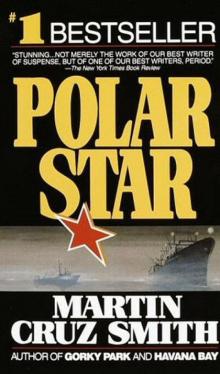 Polar Star
Polar Star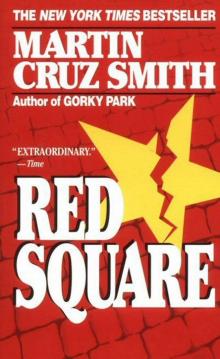 Red Square
Red Square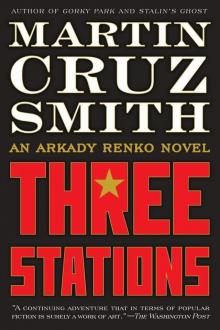 Three Stations
Three Stations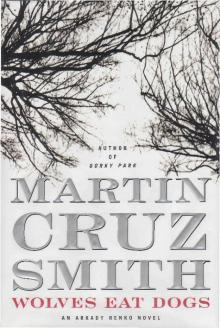 Wolves Eat Dogs
Wolves Eat Dogs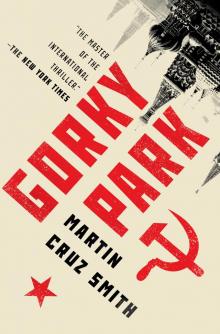 Gorky Park
Gorky Park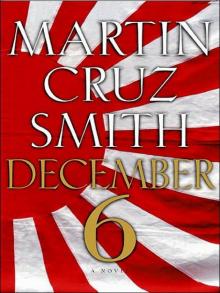 December 6
December 6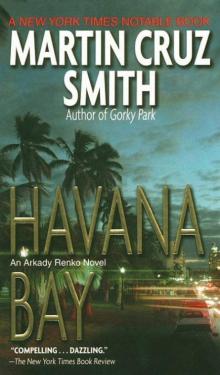 Havana Bay
Havana Bay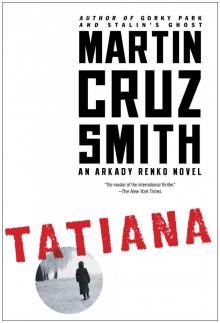 Tatiana
Tatiana The Girl From Venice
The Girl From Venice Stalin's Ghost
Stalin's Ghost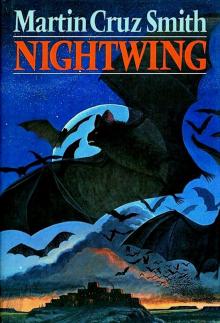 Nightwing
Nightwing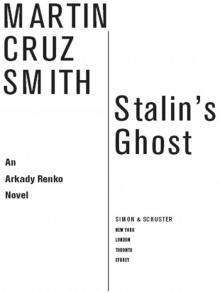 Stalin s Ghost
Stalin s Ghost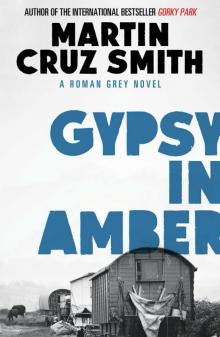 Gypsy in Amber
Gypsy in Amber Rose
Rose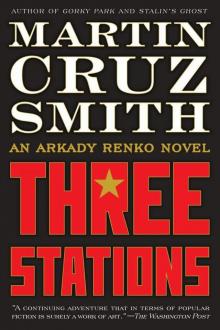 Three Stations: An Arkady Renko Novel
Three Stations: An Arkady Renko Novel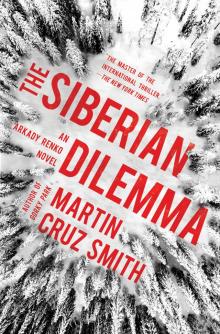 The Siberian Dilemma
The Siberian Dilemma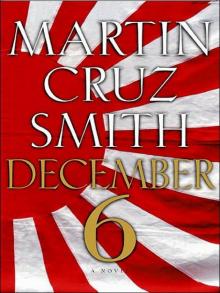 December 6 (V5.0)
December 6 (V5.0)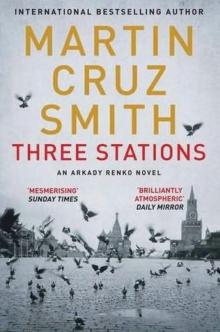 Three Stations ar-7
Three Stations ar-7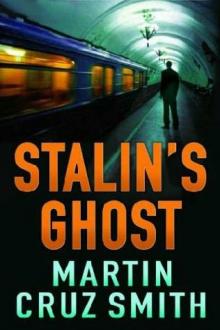 Stalin’s Ghost ar-6
Stalin’s Ghost ar-6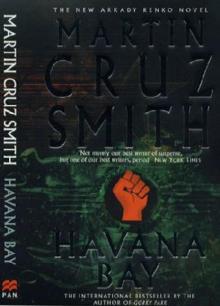 Havana Bay ar-4
Havana Bay ar-4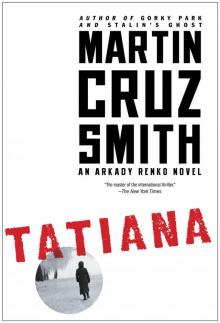 Tatiana ar-8
Tatiana ar-8